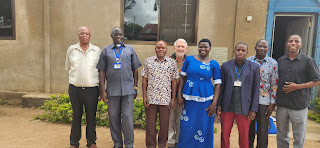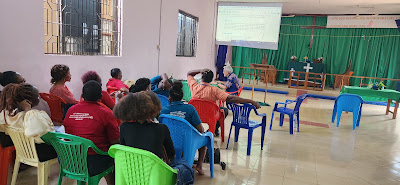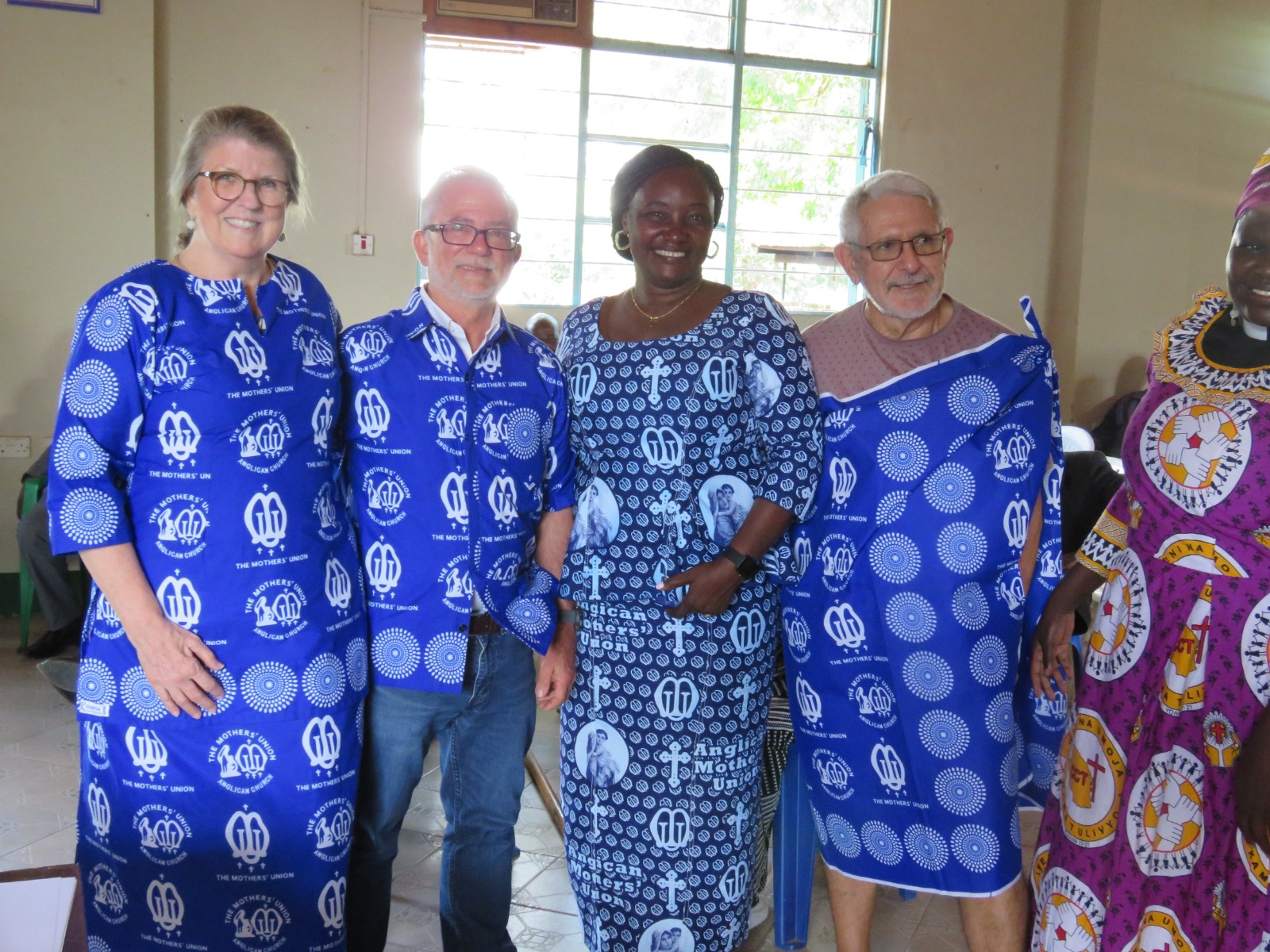WATER
 |
| Stormwater drainage 2024 |

 |
| 2017 students during school collecting water from a nearby watercourse. |
 |
| The women do all the heavy lifting |
I retired from Anglican Aid, the Sydney Anglican Diocese's overseas relief and development arm in April 2022 and then spent six months in Tanzania working in the Diocese of Musoma at the invitation of the bishop. I am essentially assisting with capacity building across various areas of the diocese.. In 2023 I led a tourof 18 Australians who visited and observed the work of the church in the Mara Region - three dioceses - Mara, Tarime and Rorya.
 |
| Stormwater drainage 2024 |

 |
| 2017 students during school collecting water from a nearby watercourse. |
 |
| The women do all the heavy lifting |
Today (Sunday 10 March, 2024) marks the end of my eleventh visit to Tanzania. The first in January 2014 was to climb Mt Kilimanjaro, the tallest mountain in Africa. It was memorable and easily the most challenging physical activity of my life.
.JPG) |
| Our porters, guides and cook (9 in all for two of us) on the eight day trek |
.JPG) |
| This is how we lived for eight days |
 |
| Taxi bike stand. Many around |
 |
| Motor cycles trailer |
 |
| A common sight across Tanzania |
 |
| In use in 2022 |
 |
| Through generous friends and colleagues over thirty laptops have brough the diocese schools and Bible College into the 21st Century |
 |
| The BBC Principal, like me has two screens |
 |
| A router which serves to provide internet at Bunda Girls Secondary School. Installed late 2023 |
 |
| Internet tower in rural area. Every community of over 150 people (note well NBN Australia) is by law required to be provided with internet |
The last five weeks have flown. After my arrival in Musoma, I started work the day after, meeting with the Management Team of the Church and explaining what I would be doing. I meet them again on Tuesday 5 March to outline the activities undertaken and hand to them responsibility for ongoing monitoring and ongoing implementation.
Since that initial meeting I have held 21 meetings with groups and individuals. I have met with sixty nine individuals, including senior staff who have been in meetings with their staff so I have met them at least twice. I have completed sixty nine documents, comprising plans for each senior leader's area, plus for heads of schools and other units across the diocese. I have also assisted the General Secretary in drafting new position descriptions for most staff across the area. I will finalise any that are not done in September when I expect to return.
I have also visited Bunda where I have spent two Saturdays with the faculty, outlining a distance education course from Sydney which will be provided on site by them for rural pastors, many of whom have worked as pastors with minimal training. The material requires reading and on the second visit staff indicated that for many of the target group, literacy would be difficult as many have only a primary school ecucation.
Visits to two schools resulted in prearation of school plans with the two heads. Isenye is a former government school, handed over to the church in 1993 to be run as a secondary school as the government was unable due to its isolation to do so. Originally constructed in the 1960s, it would have been a day's journey on tracks, not roads back then. The sealed road goes withing 30kms of the school, which borders the Serengeti National Park and occasionally has elephants chomping on favoured trees on the school grounds.
 |
| A reminder to staff at Isenye School |
.jpg) |
| The foundation stone recognises the opening of a thirty year old school after being transferred to the Anglican Church |
 |
| Sange and Mary Wangoya |
Bunda Girls School was my second school visit where I saw the completed staff housing, the almost completed principal's residence and spent two hours with the builder going through the final fitout of the guesthouse which will receive 15 students from a girls' school in July for one week. The guesthouse is planned for visitors to the school and the hope is many will come.
The education system in Tanzania is changing significantly. Primary schools which currently have ten classes (Baby, Pre Primary 1 and 2 and grades 1-7) will drop a pre-primary class and grade 7. All students will progress to secondary school. Currently there is a barrier at grade 7 and students who fail national exams finish their education at that juncture. Most significantly is that English will be taught in primary schools to prepare all Tanzanian children to be able to speak English as well as Swahili.
Secondary school will have two streams - in addition to the academic stream, a vocational stream is an option. This means bigs changes for all schools and the diocesan schools will need to do lots of planning. Secondary is forms one to four and high school is currently 5-6 but an additional year will mean seven years of high school.
The final full week was spent with various individuals and the Archdeacons, developing plans for them, the Youth Coordinator, IT and Communications Manager. I also met with the Mothers' Union secretary who wanted to discuss a business proposition buying and storing grain then selling when prices increase. I had done this with the BBC principal and he is purchaing 100 bags (100kg) of maize. Capital light but very profitable. All institutions apart from their core business also need to raise funds. There are no P&Cs or fundraising groups here so principals need to look at opportunities.
My final assignment is handing the implementation to the Diocesan Management Team on 5 March (I am finalising this blog on 10 March in Dar Es Salaam).
My last post about Strategic Planning outlined the process and the background to get to where the diocese is today. In a developing country context what has been achieved is significant to date. The Mara Diocese has 72 parishes and over 100 churches. It is a big organisation that has grown organically since 1985 with huge inputs from Anglican church partners in the UK and Australia. It is a culture organisationall based on heirarchy and fear, and this would be true across the country.
My week has been spent meeting four leaders and their teams, outlining the plan for their division developed in consultation with the head of that area (best practice would have involved the teams but I am not in an ideal world).
Tuesday was spent with the Vicar General, Stephen Bwire and his team. Comprising Canon Yona Masinde, Director of Christian Education, Rev Revocatus Gombea, Coordinator of Evangelism, Eliud Mwakalasya, Youth Coordinator, Edward Magote, Men's Ministry Coordinator, Alpha Lugoley, Principal of Bunda Bible College and Martha Obura the Secretary of Mothers' Union.
 |
| Edward Magote, Stephen Bwire, Alpha Lugoley, Martha Obura, Revocatus Gombea, Yona Masinde Eliud Mwakalasya |
The day with this and the three other groups I met with this week was to go through the plan for their area, linking it back to the strategic plan and how they as leaders of units were responsible for their contribution to the overall plan. It is my hope to assist each of them with some sort of workplan but after this week, I am realising that is very ambitious and may need to wait till later in the year when I return. However I am ensuring that position desacriptions are updated and managed to assist two of the first team to develop new PDs.
Wednesday was spent with the Finance Team led by Yona Joseph the Diocesan Accountant who has been in the role for thirty years. The accountant from Bunda, Nickson was there as were the nine cashiers or bursars of each institution that has a financial staff member maintaining accounting records.
 |
| The finance team with Yona the Diocesan Accountant in front |
Thursday was spent with the five heads of schools including one vocational college. We went throug hthe education plan. The first goal had to do with the changes to the whole education system. Primary school will now be in English medium nationally in all government schools which is the biggest change, followed by primary education concluding at grade 6 instead of 7 and an additional year being added to high school whic will now have forms 5-7. For primary students, all are now expected to continue to secondary school, rather than a hard barrier being in place and no secondary education for those who fail the national exams.
The Education Secretary outlined the changes but it did not appear to me that anyone understood the enormous amount of work involved. My information about the role of bursars did not get well received but this has been an expectation for a number of years. We did manage to prepare together a position description for heads of schools. I will visit each head separately to assist in developing a school plan.
Friday had me with an eclectic group including the Safe House Coordinator, the Farm Centre Manager, Community Developmnet College Head and the Principal of the Girls Brigade Centre. Apart from preparing position descriptions for three of the four positions, the outline of the Strategic Plan and their role in it was discussed and people seemed to take on the information and actions required enthusiastically.
Saturday had me at the Bible College, an hour's drive from Musoma. I was spending the day with lecturers outlining the PTC from Moore College Australia It was a day well spent helping to explain this was not the typical didactic style of teaching and that for the students who will come from rural villages, most who have not gone beyond primary school, learning by discussion would help them learn best (it is a differnet style of learning for most here). I am back again next week to continue this discussion and assist in developing a plan for the college.
 |
| College entrance |
 |
| Signing the visitor's book in the principal's office |
 |
| BBC Library with new computers |
When I left last July, the college was purchasing screens donated by Anglican Aid to go with the 22 desktop computers donated by Sydney Diocesan Services These desktops are the mini boxes but more powerful than most desktops in this country. Since then the college has connected to the internet which costs nothing for the connection but comes with a monthly cost. This is quite an advanced step for the college.
As I conclude so is Sunday. It was raining this morning as I wke to leave for 7am church. I managed to tune in to the Sydney rally of the Never Again is Now protest against anti-semitism. It was great to hear the anthem We Are One but we are Many sung given how divided Australia has become due to the Gaza conflict. I bought a rice cooker but I will post about that elsewhere and had a very quiet day.
 |
| This is the English congregation. Numbers down due to the rain |
 |
| Rose & mum Mary |
 |
| I spent some time over the three days with Rose (above) while mum ateat meal times |
 |
| Bishop George, Rev Patti Ricotta and myself |
 |
| A revelation not only to the Tanzanians but to me (apologies for photo quality) |
 |
| I did find an alternative use for my gifted material and demonstrated for men how women can be assisted with the heavy lifting. In fact this was better than the packs we use at home |
 |
| Gifts were given to presenters Rev Patti, Dr Young, Mrs Janet Okoth (Bishop's wife), Chair of the Mothers' Union and next to me Martha Obura (MU Secretary) which sponsored the conference. I seem to get a gift every time. New shirt again |
WATER Water is life as they say and without it you cannot live. Surrounded as the area is by Lake Victoria, the largest lake in Africa and ...
